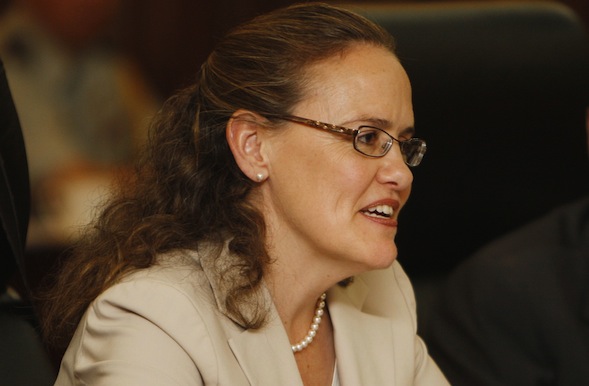Potential Successor to Gates Lays Out Military Priorities
In a speech to the Center for a New American Security, Undersecretary of Defense for Policy Michele Flournoy shed light on the approach she’d take as Pentagon chief.
Jul 31, 202049.2K Shares984.6K Views
Undersecretary of Defense for Policy Michele Flournoy (EPA/ZUMAPRESS.com)
Just to be clear: Defense Secretary Robert Gates is not talking about leaving the Pentagon. But when he ultimately does depart, possibly as soon as next year, a leading candidate to succeed him is his undersecretary for policy, Michele Flournoy. And judging by her speech Thursday at the annual conference of the think tank she co-founded, the Center for a New American Security, the first-ever female secretary of defense would focus on building a military that can respond with “flexibility” to unforeseen threats, sharing the security burden more equitably with civilian agencies and foreign partners, and curbing defense-sector budget waste.
[Security1] Most of Flournoy’s public speeches as undersecretary of defense have been to advocate for specific administration policies — chiefly, the counterinsurgency strategy in Afghanistan of which she was a key architect. At the CNAS conference, the longtime defense wonk presented a broader view of the course she thinks defense policy needs to chart.
Unsurprisingly, Flournoy’s agenda sounded much like Gates’. Echoing Gates’ recent speech at the Eisenhower library on reducing inefficiencies in defense spending, Flournoy criticized the growing costs of major weapons, aircraft and sea-vessel programs as “spending more and more to get less and less.” Warning that the turbulent global economy and ballooning federal deficit will force austerity upon the half-trillion dollar defense budget, Flournoy said that the “need to make hard choices will define this generation of national-security leaders.”
So what tasks will the Pentagon need to prioritize in a future characterized by reduced resources? First, increased training, equipping and joint operations with partner militaries — alongside the Department of State, which for years tussled with Defense for budgetary influence over foreign-military financing — so that the U.S. doesn’t take on security burdens alone. Limiting what Flournoy called “national-security adventurism” is itself a priority, she said, appearing to put unilateral military action within the category of imprudent action, “recognizing the limits of what’s possible given the world in which we live and the economic pressures under which we operate.”
All of which are in line with Gates’ priorities. But looking at the spectrum of threats the U.S. needs to prepare to confront, Flournoy went somewhat further than her boss in emphasizing the uncertainty of the future. “Intelligent adversaries will seek to confront our weaknesses, not our strengths,” she said. That means U.S. forces need to be preparing for “counterinsurgency and capacity-building operations in places like Iraq and Afghanistan, but also preparing for new threats to the primary means by which the military projects its power: military bases, our sea and air assets and then the networks in cyberspace and space.”
But since constrained resources prevent the Defense Department from adequately resourcing responses to every conceivable threat, “the point is not to assume future conflicts and threats will look like current ones,” she said. It’s that “future conflicts and threats will take many different shapes, and we can’t prepare for every contingency, so we need to focus on flexibility and agility, and creating a force that’s prepared for the most likely threats and able to adapt quickly in the face of the unpredictable.”
Approaches like that, Flournoy said, are a means to place American power on a “sustainable” footing over the long term. “We can rebalance and reform,” she said, “and if we want this great nation to remain a global leader and a force for good in the 21st century, that’s exactly what we must do.”
Flournoy has deep support in defense circles, the Obama administration and beyond to implement such an agenda as Pentagon chief. One foreign diplomat who declined to speak for attribution about administration personnel choices said he was “very impressed” with Flournoy’s “focused, business-like” approach to defense policy. As co-founder of the ascendant defense think tank in Washington, CNAS, and before that as a scholar with the Center for Strategic and International Studies, she earned her stripes issuing ponderous reports about how to integrate civilian and military elements of national security before such “whole of government” approaches became fashionable. And no one interviewed for this story was able to think of any enemies Flournoy has made, a rarity for someone possessing decades of Washington policy experience.
“Frankly, she’s not just smart — she can be extremely tough when she needs to be, and that’s reputation you need to have,” said Andrew Krepinevich, president of the Center for Strategic and Budgetary Assessments, a leading defense policy shop. “She’s the total package. There are other very well qualified people in town and out of town. But one can easily see why she’s on anyone’s shortlist to succeed Gates.”

Paula M. Graham
Reviewer
Latest Articles
Popular Articles
